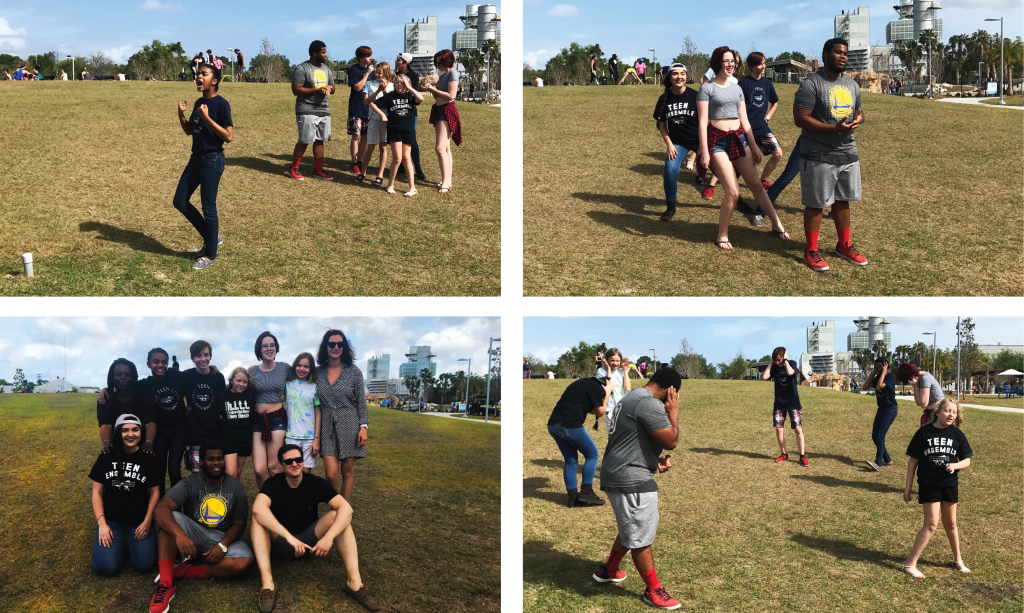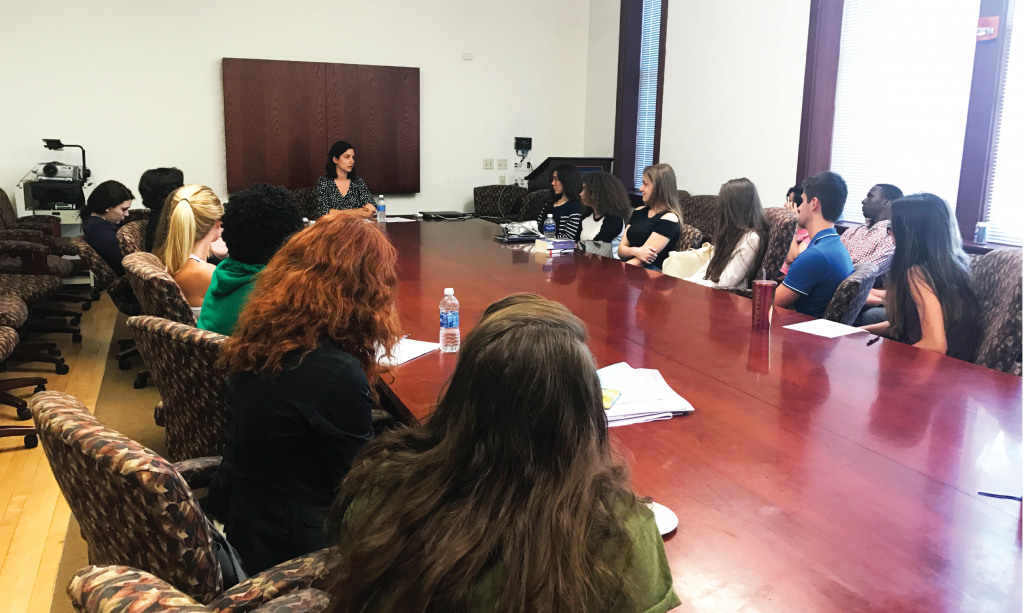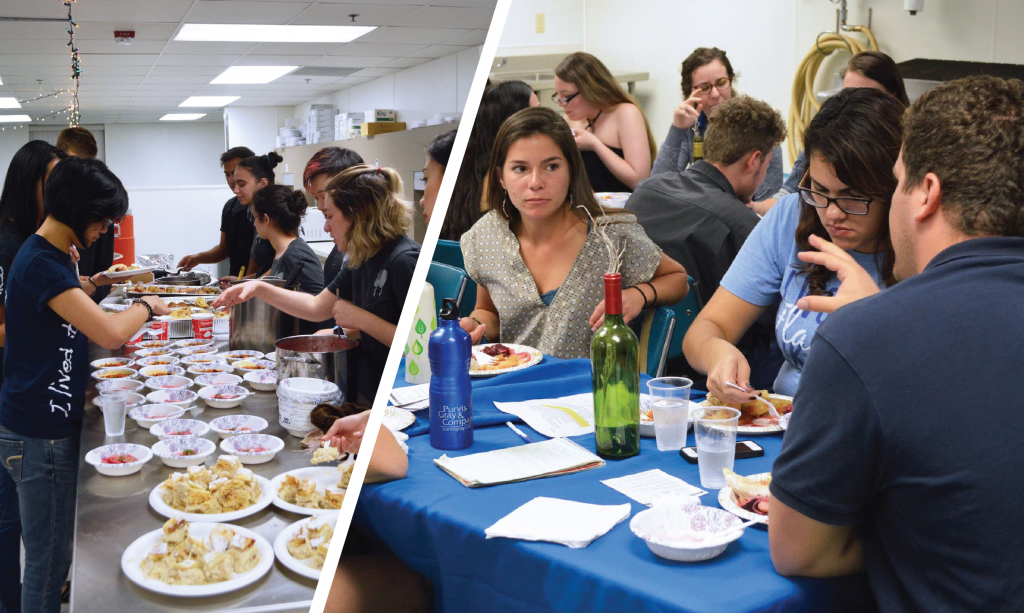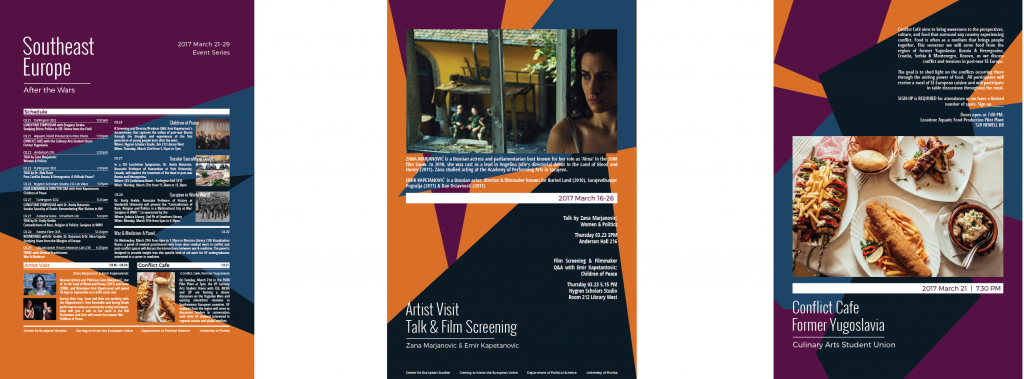
A Getting to Know Europe (GTKE) Event Series
March 21st-29th, 2017
Similar to the first series on Peacebuilding in post-conflict Northern Ireland, Southeast Europe: After the Wars was designed as a full week and a half exploring the post conflict space of former Yugoslavia with a speaker series, film screening and director Q&A, a conflict café hosted by the Culinary Arts Student Union and a ten-day artist visit.
Artist Visit
Renowned Bosnian Actress and Parliamentarian Zana Marjanović, star of Snow (2008) and Angelina Jolie’s directorial debut film In the Land of Blood and Honey (2011), and filmmaker Emir Kapetanović spent 10-days in Gainesville, during which time, they worked with local K-12 students in the Hippodrome Spring Break camp and the Teen Ensemble group on acting techniques and drama theory. On Saturday, March 25th, the Hippodrome Teen Ensemble performed the work they had created with Emir and Zana at the 352Creates in the Park event at Depot Park.

Also during their visit, Zana gave a talk on her experience as a member of the Bosnian House of Representatives entitled “Women & Politics” on March 22nd. Notably, her talk was well attended by young Southern Europeans studying completely bachelor degrees at UF who plan on participating in local and national politics in the Balkans region after college. On March 23rd, Emir screened his newest film Children of Peace, a documentary that captures the milieu of post-conflict Bosnia through the experiences and thoughts of the first generation of young Bosnians born after the wars and followed the screening with a Q&A session.

Conflict Café
On the opening day of the event series, the Culinary Arts Student Union (CASU), in conjunction with Multicultural and Diversity Affairs and the International Scholars Program, hosted a Conflict Café focused on former Yugoslavia. The CASU students cooked a large meal of Eastern European foods and then hosted a dinner and discussion session with 60 UF undergraduates. UF undergraduates from the former Yugoslav states acted as moderators during the discussions, focusing on questions of ethnic identity, nationalism and life in pluralist societies.

Talk Series
The series began on March 21st with a CES Lunchtime Symposium with Dragana Svraka, Ph.D. Candidate in the UF Department of Political Science. Dragana presented her fieldwork experiences and findings about comparative ethnic politics from her recent fieldwork conducted in Southeast Europe. On March 23rd, Aida Hozic, Associate Professor of International Relations in the UF Department of Political Science, gave a talk entitled “Post-Conflict Bosnia & Herzegovina: A Difficult Peace?” on the infrastructural and politics problems that continue to plague the country more than twenty years after a peace has been declared.
During the following week, beginning on March 27th with a Lunchtime Symposium with Amila Buturović, Associate Professor of Humanities at York University in Canada, the week shifted it’s focus to a historical perspective on ethnic diversity, conflict and coexistence in the Ottoman and Yugoslav Balkans. Dr. Buturović’s Lunchtime Symposium, entitled “Secular Sacrality of Death: Remembering War Victims in BiH.” explored how artifacts of death, tombs, memorials, cemeteries, etc. present a picture of ethnic and religious plurality and coexistence that contrasts with the ethnic and religious tensions that led to the dissolution of Yugoslavia. In a similar vein, Emily Greble, Associate Professor of History at Vanderbilt University, gave a talk entitled “Contradictions of Race, Religion and Politics in a Multicultural City of War: Sarajevo in WWII,” co-sponsored by the series on “Empire, Religion and Ethnicity in Europe and Beyond,” which demonstrated the complexity of identities and their interactions in WWII Sarajevo. Greble’s talk was followed by a roundtable on March 28th with Dr. Greble and Dr. Buturović, moderated by Nina Caputo, Associate Professor in the UF History Department, on “Studying Islam from the Margins of Europe.”
The event series concluded the following day on March 29th with a panel on War & Medicine with Chuck Hobson, Surgeon at Shands Hospital who spent his post-residency years establishing an Emergency Medical Program in wartime Bosnia, and Jenny Baxley Lee, a lecturer and therapist in the UF Center for Arts in Medicine, who leads a study abroad program on art and medicine each summer in Belfast, Northern Ireland. Dr. Hobson and Ms. Lee compared their experiences working in medicine in conflict and post-conflict spaces, much to the interest of UF pre-med students in attendance who were interested in pursuing similar experiences in their future medical careers.
